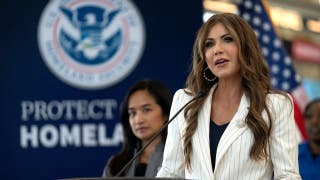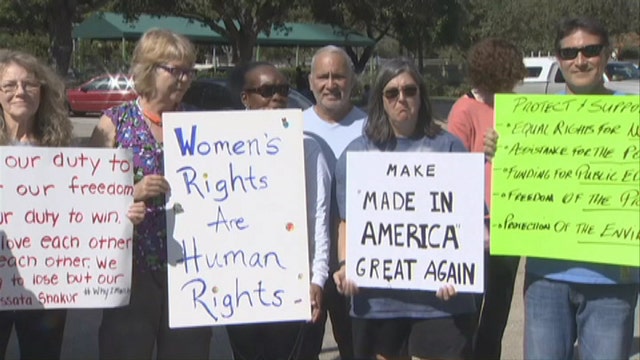Anti-Trump protests take place across the country
Julie Banderas reports on marches planned by women's groups and other demonstrations
WASHINGTON – Wearing pink, pointy-eared "pussyhats" to mock the new president, hundreds of thousands of women massed in the nation's capital and cities around the globe Saturday to send Donald Trump an emphatic message that they won't let his agenda go unchallenged over the next four years.
"We march today for the moral core of this nation, against which our new president is waging a war," actress America Ferrera told the Washington crowd. "Our dignity, our character, our rights have all been under attack and a platform of hate and division assumed power yesterday. But the president is not America. ... We are America and we are here to stay."
The women brandished signs with messages such as "Women won't back down" and "Less fear more love" and decried Trump's stand on such issues as abortion, health care, diversity and climate change. The message reverberated at demonstrations around the globe, from Paris and Berlin to Sydney and beyond.
There were early signs that the crowds in Washington could top those that gathered for Trump's inauguration on Friday. City officials said organizers of the Women's March on Washington more than doubled their turnout estimate to 500,000 as crowds began swelling and subways into the city became clogged with participants.
It wasn't just a Washington phenomenon and it wasn't just women: More than 600 "sister marches" were planned across the country and around the world, and plenty of men were part of the tableau, too. Organizers estimated 3 million would march worldwide.
As the rally alongside the National Mall took shape, Trump opened his first full day as president by attending a prayer service at the Washington National Cathedral, a tradition for the day after inauguration.
Outside on the streets of Washington, feminist leader Gloria Steinem described the worldwide mobilization as "the upside of the downside: This is an outpouring of energy and democracy like I have never seen in my very long life."
"Sometimes we must put our bodies where our beliefs are," she told the Washington crowd, labeling Trump an "impossible president."
In Paris, thousands marched in the Eiffel Tower neighborhood in a joyful atmosphere, singing and carrying posters reading: "We have our eyes on you Mr. Trump" and "With our sisters in Washington."
At a rally in Concord, New Hampshire, author Jodi Picoult said: "We in New Hampshire are not in the habit of going in reverse. We have the backs of those who are less fortunate — who may be struggling for health care, for environmental rights, for racial equality, for a fair wage, for justice."
Hillary Clinton, who lost to Trump, took to Twitter to thank the participants for "standing, speaking and marching for our values."
Retired teacher Linda Lastella, 69, who came to Washington from Metuchen, New Jersey, said she had never marched before but felt the need to speak out when "many nations are experiencing this same kind of pullback and hateful, hateful attitudes."
"It just seemed like we needed to make a very firm stand of where we were," she said.
Rose Wurm, 64, a retired medical secretary from Bedford, Pennsylvania, boarded a Washington-bound bus in Hagerstown, Maryland, at 7 a.m. carrying two signs: one asking Trump to stop tweeting, and one asking him to fix, not trash, the Obamacare health law.
"There are parts of it that do need change. It's something new, something unique that's not going to be perfect right out of the gate," she said.
Many wore hand-knit "pussyhats" — a message of female empowerment aimed squarely at Trump's crude boast about grabbing women's genitals.
The march attracted significant support from celebrities. Ferrera led the artists' contingent, and those scheduled to speak in Washington included Scarlett Johansson, Ashley Judd, Melissa Harris-Perry and Michael Moore. The promised performance lineup included Janelle Monae, Maxwell, Samantha Ronson, the Indigo Girls and Mary Chapin Carpenter. Cher, Katy Perry and Julianne Moore all were expected to attend.
In Prague, hundreds gathered in Wenceslas Square in freezing weather, waving portraits of Trump and Russia's Vladimir Putin and holding banners that read "This is just the beginning," ''Kindness" and "Love."
"We are worried about the way some politicians talk, especially during the American elections," said organizer Johanna Nejedlova.
In Copenhagen, Denmark, march organizer Lesley-Ann Brown said: "Nationalist, racist and misogynistic trends are growing worldwide and threaten the most marginalized groups in our societies including women, people of color, immigrants, Muslims, the LGBT community and people with disabilities."
In Sydney, thousands of Australians marched in solidarity in Hyde Park. One organizer said hatred, bigotry and racism are not only America's problems.
The idea for the women's march took off after a number of women posted on social media in the hours after Trump's election about the need to mobilize. Hundreds of groups quickly joined the cause, pushing a wide range of causes, including abortion rights, gun control, climate change and immigrant rights.
While the march organizers' "mission and vision" statement never mentions Trump and stresses broad themes, including the message that "women's rights are human rights," the unifying factor among those turning out appeared to be a loathing for the new president and dismay that so much of the country voted for him.
Friday's unrest during the inauguration led police to use pepper spray and stun grenades to prevent the chaos from spilling into Trump's formal procession and the evening balls. About a mile from the National Mall, police gave chase to a group of about 100 protesters who smashed the windows of downtown businesses, including a Starbucks, a Bank of America and a McDonald's, as they denounced capitalism and Trump.









































